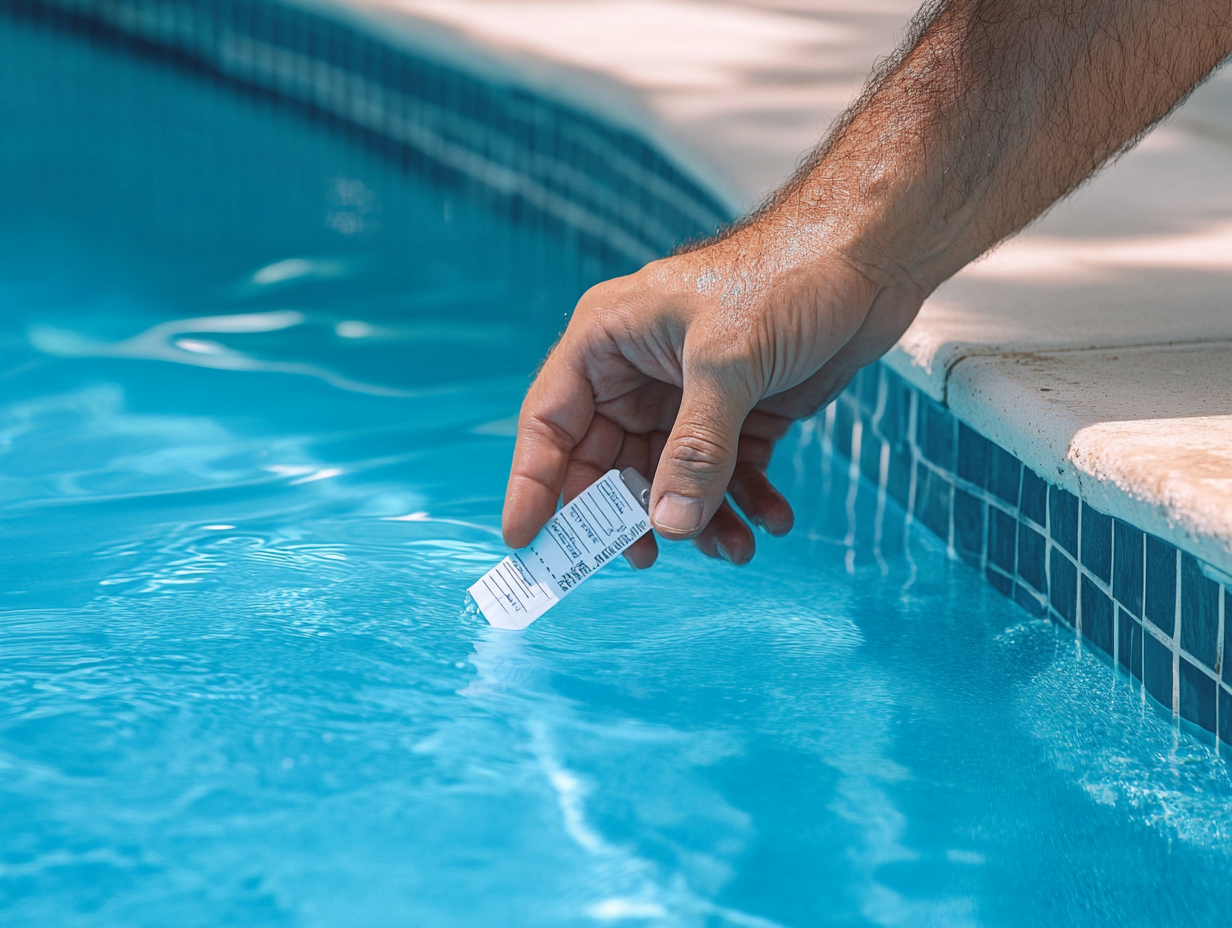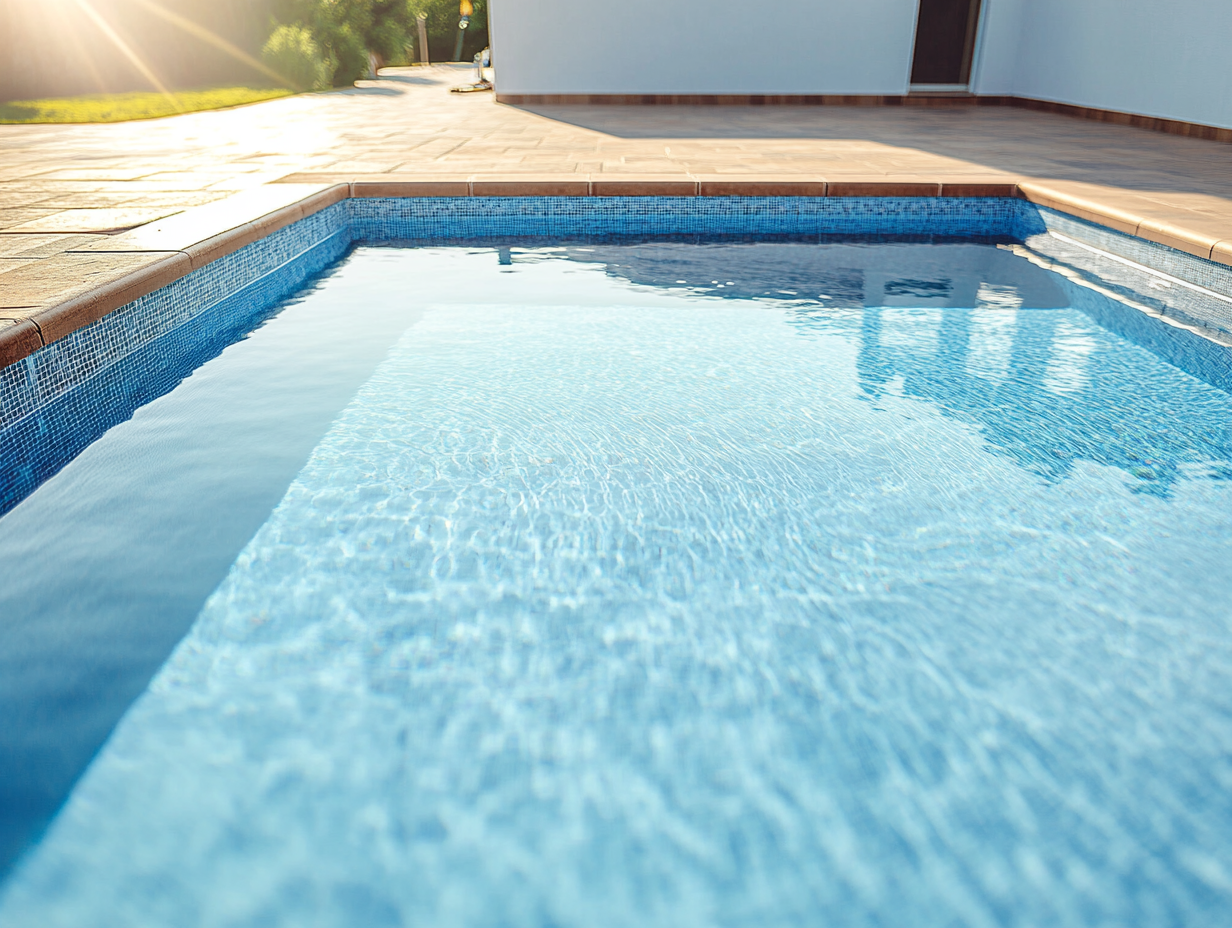Swimming Pool Draining & Restart Service
Sometimes creating the immaculate pool you deserve means starting fresh.
Rated 4.9/5 by 2,200+ customer reviews
Starting Over with a Swimming Pool Draining & Restart
Sometimes things can get out of control. A week of travel could mean a frightening surprise on your return. Trusting the wrong San Diego pool company to balance your chemicals can go wrong. It happens –– we’ve seen it. We’ve also transformed unsafe pools into immaculate oases through our pool draining and restart service.
If your pool water just won’t clear or your chemicals are hopelessly out of balance, we can help.
If your pool water just won’t clear or your chemicals are hopelessly out of balance, we can help.
Have two spare minutes? That’s all it takes to get a custom quote on your pool’s needs.
Pool Chemistry: A Delicate Balancing Act
Chemicals keep your swimming pool’s water crystal clear and swim-ready. However, they must remain balanced, or things can quickly deteriorate. Too far toward one side of the pH spectrum or the other and your pool could become unsanitary or even unsafe. Some of the potential dangers of out-of-balance pool chemicals include:
• Scaling on pool walls, steps, handrails, and inside equipment
• Algal blooms
• Mold growth
• Cloudy, hazy, unsafe water
• Potentially serious health impacts
Concerned your pool chemicals are out of balance? We can quickly test and then act to address the situation. In some cases, adjusting the balance is possible. In others, a drain and restart is the only option.
• Scaling on pool walls, steps, handrails, and inside equipment
• Algal blooms
• Mold growth
• Cloudy, hazy, unsafe water
• Potentially serious health impacts
Concerned your pool chemicals are out of balance? We can quickly test and then act to address the situation. In some cases, adjusting the balance is possible. In others, a drain and restart is the only option.
From cleaning to repairs to installations, we've got you covered.
What's included with our weekly pool cleaning service?
Check & Balance Pool Chemicals
Say farewell to hassle as we balance your pool chemicals for optimum water quality.
Inspect Filter System & Backwash
Clean filters are the secret to an immaculate pool all year long.
Manually Vacuum Pool Surfaces
Nothing can replace a thorough, hand cleaning.
Treat for Algae
Conquer the green with our expert algae treatments.
Clean Skimmer & Pump Baskets
We keep the water flowing freely to help ensure your pool is immaculate.
Empty Catch & Maintain Automatic Pool Vacuum
It’s all about peace of mind that everything’s operating optimally.
Brush Steps & Walls
Regular deep cleaning ensures you have a tranquil oasis.
Skim Water, Clean Leaves, Remove Debris
We leave your pool looking immaculate for worry-free enjoyment.
Detailed Post-Service Report
We detail every step and all our findings so you can make accurate decisions.
What's included with Weekly Pool Service?

Check & Balance Pool Chemicals
Say farewell to hassle as we balance your pool chemicals for optimum water quality.
Inspect Filter System & Backwash
Clean filters are the secret to an immaculate pool all year long.
Manually Vacuum Pool Surfaces
Nothing can replace a thorough, hand cleaning.
Treat for Algae
Conquer the green with our expert algae treatments.Clean Skimmer & Pump Baskets
We keep the water flowing freely to help ensure your pool is immaculate.Empty Catch & Maintain Automatic Pool Vacuum
It’s all about peace of mind that everything’s operating optimally.Brush Steps & Walls
Regular deep cleaning ensures you have a tranquil oasis.Skim Water, Clean Leaves, Remove Debris
We leave your pool looking immaculate for worry-free enjoyment.Detailed Post-Service Report
We detail every step and all our findings so you can make accurate decisions.
Here's how it works.

step 1
Get a quote
View transparent pricing options, service plans, and schedule your service in just 5 minutes or less, all online.
step 2
Weekly specialist visits
A specialist will visit your property weekly to make sure your pool is looking its best. After each visit, you'll get a service summary with tips and suggestions for care between visits.
step 3
Guaranteed results
We are so committed to providing you an awesome experience that if you aren't completely satisfied, we'll come back and fix it, free of charge. *
Professional Pool Draining & Restart Service
Without the right chemicals, your pool’s water will turn cloudy, and algae can spread. However, if it’s not balanced, it can create even more problems. Cabana’s pool draining and restart service ensures that your pool is immaculate and ready for year-round, stress-free enjoyment.
Your neighbors say it best.



5,000+
Satisfied Customers
Let's get back to swimming.
Give us a call.
Talk with an expert and get a free quote.
Sun – Sat : 8:00 AM – 5:00 PM PST
Get online quote.
Get a fast, free online quote in just 5 minutes.
Need support?
Get your questions answered and connect with one of our experts in just seconds.
Popular Locations
Los Angeles, CAMalibu, CAVenice, CAPacific Palisades, CACulver City, CASherman Oaks, CAChatsworth, CABeverly Hills, CAHidden Hills, CABrentwood, CACalabasas, CAEncino, CAWoodland Hills, CAWestlake Village, CASanta Monica, CAPasadena, CAGlendale, CARolling Hills Estates, CAArcadia, CALa Canada Flintridge, CAWest Hills, CABel Air, CAHollywood Hills, CAManhattan Beach, CAWest Hollywood, CAPalos Verdes Estates, CARancho Palos Verdes, CALong Beach, CARedondo Beach, CAAgoura Hills, CABurbank, CAMar Vista, CAEl Segundo, CAPlaya Vista, CAPlaya Del Rey, CAMarina Del Rey, CASilver Lake, CAStudio City, CAInglewood, CATorrance, CA